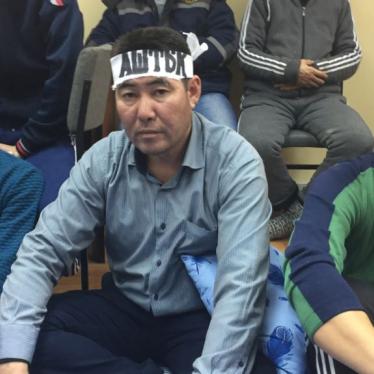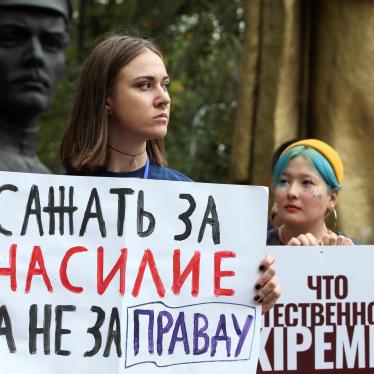By Vika Kim
International Women’s Day 2021, on Monday, was the first time authorities in Almaty, Kazakhstan allowed a march celebrating the day to proceed. I joined the five-kilometer march along one of the city’s main roads, with hundreds of people of different ages and genders, all seeking to draw attention to women’s rights in Kazakhstan.
Participants demanded gender equality and respect for women’s rights, including the rights of lesbian, bisexual, queer, and transgender women. They called for the criminalization of domestic violence and for a new law on combating domestic violence that has stalled in parliament, finally to be adopted. There is a law on prevention of domestic violence on the books and the number of state-funded crisis centers has been increased, but other serious legislative gaps, an inadequate police response, and a range of barriers to access to justice, leave women in practice with little or no protection.
Hundreds of people showed up, some with placards they had drawn late into the night before, galvanizing onlookers to wave or applaud as the marchers passed their windows. None of the activists were detained or threatened with arrest, in contrast to past patterns in Kazakhstan. Last year, two activists were convicted of “petty hooliganism” for burning a symbolic funeral wreath to mark Women’s Day. And instead of intervening in the march, as has happened with protests on many human rights issues, police this year were present to ensure order and provide security to participants.
But as they say, one swallow does not a summer make, and one day of allowing a march to proceed and respecting peaceful assembly is not enough.
Kazakhstan has an obligation – as a party to the UN Convention on the Elimination of All Forms of Discrimination Against Women (CEDAW) - to work to eliminate violence, including domestic violence, against women by ensuring adequate protection, access to essential services for survivors and holding abusers accountable. In 2020, Kazakhstan was invited to join the Council of Europe Convention on preventing and combating violence against women and domestic violence. The Kazakhstan government has expressed interest in doing this and so should take the necessary steps, and ensure its laws and policies meet the convention’s standards.
For Kazakhstan to achieve gender equality and end violence against women, women's voices must be listened to.








